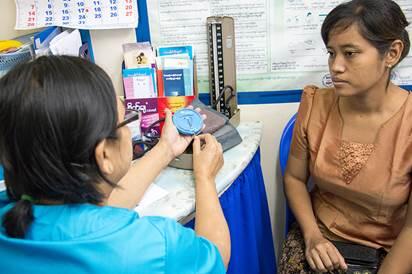Thirty year old Moe Moe Khaing listened intently as the Dr explained about the procedure and effects of having an implant inserted. As the explanation continued, her thoughts returned to her home: rental fees were due a week ago; her three year old son had been sick for the last three days; her ten year old daughter needed new clothes; and finally, she thought about her drunken husband, a casual labourer spending most of his earnings on liquor, she sighed. Her mind made up, she announced that she would have an implant inserted at a clinic operated by Marie Stopes International (MSI).

MSI had been assisting low income families, like Ma Moe Moe Khaing’s, with long acting reversible implant contraceptives for a number of years. While private clinics are costly and unaffordable for low income families, MSI offers implant services free of charge. Dr. Le Yin Win, an MSI Centre Manager, explained: “We have criteria for our potential implant beneficiaries. One of them is that the family must earn less than US$170 per month. Then they are entitled to our services free of charge. Before the treatment, we give counselling to potential clients so that they can make an informed choice.”
More and more women, from all walks of life, are welcoming the implant, which is easy to insert and remove. Moe Moe Khaing said: “The implant is popular because it is easy, and effective as well. That is why I choose it.” She said she opted for the implant that lasts for five years rather than the one that lasts for three. Both can be removed at any time and fertility returns as soon as the implant is removed.
In 2016, for the first time, UNFPA, in collaboration with the Ministry of Health and Sports (MHS), will provide US$1 million worth of implant contraceptives, part of US$2.6 million of reproductive health related supplies. Other partner agencies include Jhpiego, Marie Stopes International, Pathfinder and Population Services International. The initiative is nationwide, helping women and families from low income neighbourhoods, ethnic minorities and remote areas prevent unwanted pregnancies, while also reducing maternal mortalities.
Daw Hla Mya Thway Eindra, a senior official from the MHS, said: “We will start rolling out the implant in Yangon, Mandalay and Magway regions, then later to other regions. First of all, we have to train doctors. And we will only provide implant services in hospitals where doctors are trained to an international standard.” She added that the implant contraceptive was very popular among women of child bearing age. In Myanmar, one in four women of reproductive age cannot access the modern contraceptives they need to prevent or delay pregnancy. Every year, 2,000 Myanmar women die in pregnancy and childbirth, and from unsafe abortions. Daw Hla Hla Aye, Assistant Representative, UNFPA, said: “The current situation in the country shows that nearly 1.8 million women of reproductive age, or one fourth of Myanmar women of reproductive age, do not have access to modern contraceptive methods, it affects them and many aspects of their family lives.”
None would be more appreciative than Ma Theint Theint Tin, a 36 year old casual labourer from a south east peri- urban area of Yangon, supporting a family of five. Her enthusiasm echoed through her words: “I have been looking forward to this moment. Now, I can concentrate on my work, and family. My husband is completely supportive of the initiative, it will remove anxiety and uncertainty between us. I will share the information with other women in my neighbourhood in a similar situation. Low income families need the implant contraceptive method much more than others.
To achieve maximum impact, supply and capacity building are also important. Daw Hla Hla Aye said: “UNFPA provides support to strengthen the supply chain management, as well as financial support for capacity building for service providers, both in the public and private sector through partners who offer quality family planning services. The initiative will certainly help reduce the unmet need for contraceptives, unwanted pregnancies, abortions, as well as maternal morbidity and mortality among women of reproductive age.”



